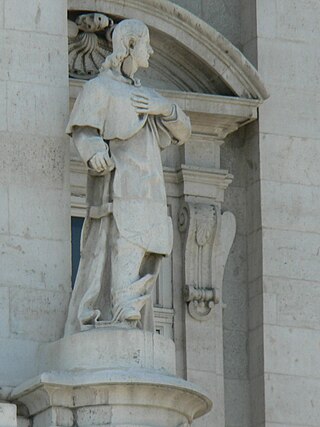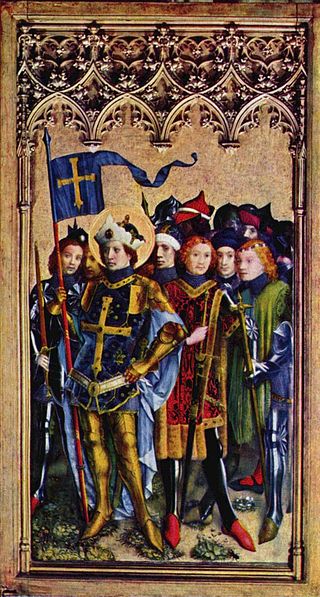
The Kingdom of Asturias was a kingdom in the Iberian Peninsula founded by the Visigothic nobleman Pelagius. It was the first Christian political entity established after the Umayyad conquest of Visigothic Hispania in 718. That year, Pelagius defeated an Umayyad army at the Battle of Covadonga, in what is usually regarded as the beginning of the Reconquista.
Justin may refer to:

Bermudo I, called the Deacon or the Monk, was the King of Asturias from 788 or 789 until his abdication in 791. He was a son of Fruela of Cantabria, a nephew of Alfonso I, and a brother of Aurelius. The nature of the end of his reign ushered in a new period in Asturian-Arab relations.
Pelagius was a British monk whose theology is known as Pelagianism.

The Theban Legion figures in Christian hagiography as a Roman legion from Egypt —"six thousand six hundred and sixty-six men" — consisting of Christian soldiers who were martyred together in 286, according to the hagiographies of Maurice, the chief among the Legion's saints. Their feast day is held on September 22.
Paschasius is a masculine given name. It may refer to:

The Martyrs of Córdoba were forty-eight Christian martyrs who were executed under the rule of Muslim administration in Al-Andalus. The hagiographical treatise written by the Iberian Christian and Latinist scholar Eulogius of Córdoba describes in detail the executions of the martyrs for capital violations of Islamic law (sharīʿa), including apostasy and blasphemy. The martyrdoms recorded by Eulogius took place between 850 and 859 AD, which according to the Mālikī judges of al-Andalus broke the treaty signed between Muslims and their Christian subjects.
The Church of England commemorates many of the same saints as those in the General Roman Calendar, mostly on the same days, but also commemorates various notable Christians who have not been canonised by Rome, with a particular though not exclusive emphasis on those of English origin. There are differences in the calendars of other churches of the Anglican Communion.
Saints in Christianity are a people recognized as having lived a holy life and as being an exemplar and model for other Christians. Beginning in the 10th century, the Catholic Church began to centralise and formalise the process of recognising saints through canonisation.

Romanus of Caesarea, also known as Romanus of Antioch, is venerated as a martyr. A deacon of Caesarea, he was martyred at Antioch.
Abraham is a given name of Hebrew origin and a Biblical patriarch ; the father of the Abrahamic religions: Judaism, Christianity and Islam.

Saint Marina of Aguas Santas (Marina of Ourense) (c.120–135 AD) is a virgin martyr from Aguas Santas, in the province of Ourense. The story of her life as it has been preserved is a mixture of fact and legends.
Abdisho and Abda were two successive bishops of Kashkar who were martyred along with 38 companions in 376 during the Forty-Year Persecution in the Sasanian Empire.
Zanitas and Lazarus were martyrs of the Christian church in the Sasanid Empire.

Saint Donatus of Arezzo is the patron saint of Arezzo, and considered a bishop of the city.
Aurelius may refer to members of the ancient Roman plebian family Aurelia gens, especially Emperor Marcus Aurelius.
Mauritius is a masculine given name. Bearers include:
Prudent de Narbonne was a Christian deacon who was martyred in Narbonne in what is now France in the 3rd century. He is venerated by the Catholic Church as a saint. His relics are said to have effected various miracles. They were found in a church in Narbonne and taken to Bèze Abbey in 883. They were held for safe keeping during the Norman invasions in the cathedral of Saint-Étienne de Dijon, then returned to the abbey. Later they were restored to Narbonne, and are held in an elaborate reliquary in Narbonne Cathedral.
Agathodorus was an early Christian martyr in Pergamon, Asia Minor.

The Martyrs of Persia under Shapur II were Assyrian Christian martyrs who were put to death by Shapur II of Persia for failing to renounce their faith. There may have been several thousand in total. They are remembered as a group in the Roman and Orthodox calendars. The Roman Martyrology gives feast days of 6 April, 22 April and 9 May for different groups.